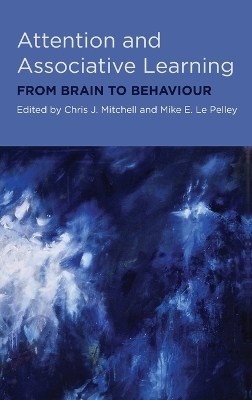
Attention and Associative Learning
Oxford University Press (Verlag)
978-0-19-955053-1 (ISBN)
The idea of an interaction between attention and learning has experienced a huge surge of interest in recent years. Advances in behavioural neuroscience have made it possible to investigate the neural basis of attention mechanisms; advances in connectionist modelling techniques have allowed us to implement and test more complex computational models of the operation of these mechanisms; and recent studies have implicated impairments in the ability to deploy selective attention appropriately in disorders such as schizophrenia and Parkinson's Disease.
This book brings together leading international learning and attention researchers to provide both a comprehensive and wide-ranging overview of the current state of knowledge of this area as well as new perspectives and directions for the future. There are coherent themes that run throughout the book, but there are also, inevitably, fundamental disagreements between contributors on the role of attention in learning. Together, the views expressed in this book paint a picture of a vibrant and exciting area of psychological research, and will be essential reading for researchers of learning and attention.
Dr Mitchell studied for his BSc and PhD in psychology, and also conducted 3 years of post-doctoral research, at University College London (1987-1997). His PhD examined conditioning effects in cancer chemotherapy using a rat model, and was supervised by Prof Cecelia Heyes. His post-doc, also with Prof Heyes, concerned an investigation of imitation in rats. Dr Mitchell then moved north to the Wirral, where he worked for Unilever Research, Port Sunlight, as a consumer scientist. Since July 2000, he has worked in the School of Psychology, University of New South Wales, Australia. His first position was as a post doctoral research fellow with Prof Peter Lovibond. Dr Mitchell became a member of faculty in 2002. Throughout this period, the focus of his research has been on human associative and perceptual learning. Dr LePelly studied for his undergraduate degree in Natural Sciences at Emmanuel College, Cambridge, and carried on to complete his Ph.D. in Experimental Psychology (investigating human associative learning) at the University of Cambridge under the supervision of I. P. L. McLaren, graduating in 2002. He then held the Sir Alan Wilson Research Fellowship at Emmanuel College, Cambridge, for just over two years before taking up a lectureship in the School of Psychology at Cardiff University in 2004, and he has been there ever since. Throughout this time his main research interests have been in the fields of human and animal associative learning.
1. An introduction to attention and learning ; 2. Two theories of attention: A review and a possible integration ; 3. Attentional learning ; 4. Selective attention to conditioned stimuli in human discrimination learning: Untangling the effects of outcome prediction, valence, arousal and uncertainty ; 5. Latent inhibition ; 6. Attention and perceptual learning ; 7. Acquired distinctiveness and equivalence: A synthesis ; 8. Attention and human associative learning ; 9. On the use of the term 'attention' ; 10. Attention and memory in human learning ; 11. Backward blocking of relevance-indicating cues:Evidence for locally eayesian learning ; 12. Brain systems of attention in associative learning ; 13. Neural correlates of attentional set ; 14. Clinical studies of attention and learning
| Erscheint lt. Verlag | 12.8.2010 |
|---|---|
| Verlagsort | Oxford |
| Sprache | englisch |
| Maße | 162 x 236 mm |
| Gewicht | 754 g |
| Themenwelt | Geisteswissenschaften ► Psychologie ► Allgemeine Psychologie |
| Geisteswissenschaften ► Psychologie ► Pädagogische Psychologie | |
| Geisteswissenschaften ► Psychologie ► Test in der Psychologie | |
| Geisteswissenschaften ► Psychologie ► Verhaltenstherapie | |
| Naturwissenschaften ► Biologie ► Zoologie | |
| ISBN-10 | 0-19-955053-0 / 0199550530 |
| ISBN-13 | 978-0-19-955053-1 / 9780199550531 |
| Zustand | Neuware |
| Haben Sie eine Frage zum Produkt? |
aus dem Bereich


